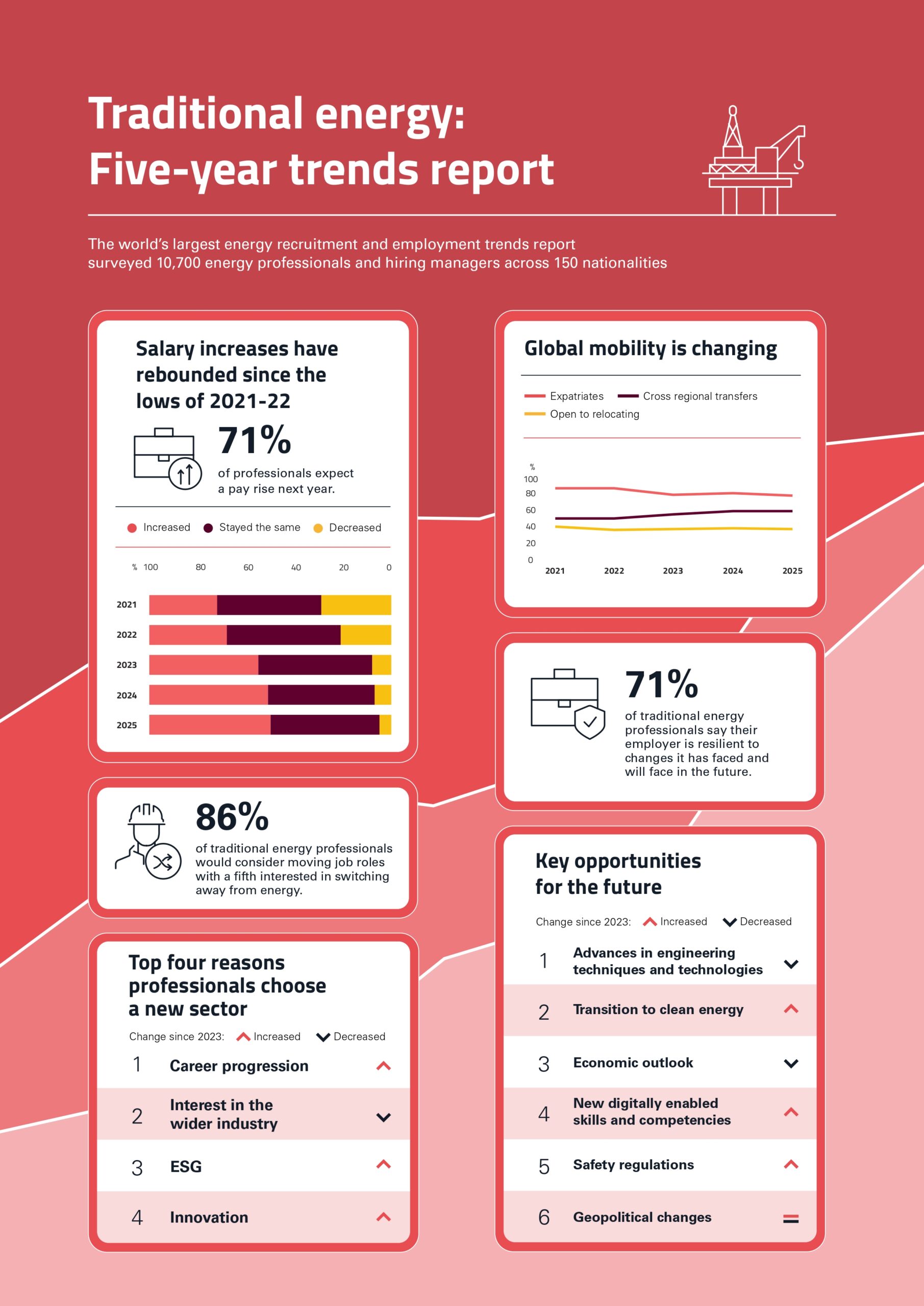The ninth annual Global Energy Talent Index (GETI), the world’s most established and comprehensive energy workforce trends report, introduces a five-year trends analysis for the first time. The report highlights that salaries in traditional energy are experiencing a strong rebound with 50% of professionals seeing a pay rise in 2025 and 71% expecting further rises next year. However, with reluctance to relocate increasing by 9% since 2021 and interest in renewables intensifying, companies must refine talent strategies to retain experienced professionals and sustain industry resilience.
Salaries Continue to Rebound
The GETI 2025 report*, reveals a positive trend in salary increases after the challenging period of 2021 and 2022 with half of traditional energy professionals receiving a pay rise in 2025 and 26% seeing increases of over 5%.
This year is the first year where increases show signs of flattening out, with the percentage reporting a large increase (5% or more) falling for the first time since 2021). However, optimism is also on the rise, with 71% of professionals expecting pay increases in the next year, up from just 49% in 2021.
Janette Marx, CEO of Airswift, comments: “As the industry recovered from COVID-19, pay did not keep up with inflation. Over the last couple of years, many companies focused on closing this gap to accurately reflect the highly technical competency of the positions, which has helped attract and retain employees.”
Global Mobility and Workforce Evolution
While 80% of traditional energy professionals would consider relocating for work, this figure has declined from 89% in 2021, reflecting a shift in career priorities. Europe remains the most preferred destination, though its appeal has declined from a peak of 30% in 2022 to 26% in 2025. The Middle East remains a strong second choice, while interest in North America has remained stable.
Marx explains: “Some companies are moving to localise expatriates sooner to reduce overhead, which is weakening the financial incentive to relocate. As the industry’s contractor cohort remains strong however, these factors shouldn’t lead to a shortage of talent.”
Career progression remains the top driver for relocation, rising to 50% in 2025, while remuneration has gained importance, replacing culture as a key motivator. Meanwhile, professionals cite proximity to family as the primary reason for reluctance to relocate, though this concern has declined year-on-year.
Talent Retention and Career Development
As demand for expertise in traditional energy grows, 86% of professionals would consider moving to another role, with 62% open to opportunities within traditional energy. Interest in switching to renewables has also surged, rising from 56% in 2023 to 71% in 2025. Technology remains the most attractive non-energy sector, with 28% of professionals considering a move.
Future Workforce Trends and Industry Outlook
The energy transition continues to reshape the sector, with professionals identifying advances in engineering techniques and technology (37%) and the transition to clean energy (37%) as the biggest industry opportunities. Meanwhile, optimism in employer resilience has grown, with 71% of professionals confident in their company’s ability to navigate future challenges.
Marx observes: “The results reflect the story of how the industry is evolving. Pressure has increased to make the industry cleaner, safer and more efficient – advanced technologies and techniques remain a key part of that, but AI is also coming to the fore, as we saw in last year’s GETI. Additionally, it has become increasingly imperative that we achieve this regardless of the political climate or economic pressures.”
As traditional energy professionals look to the years ahead, employers will need to continue investing in career development, workforce flexibility, and technical skills training to retain top talent and ensure long-term industry resilience.
The GETI 2025 report*, produced by Airswift, available for download at https://www.getireport.com/







